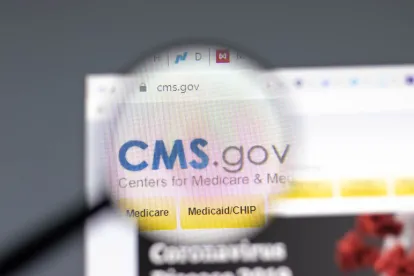The Centers for Medicare and Medicaid Services (CMS) recently released the request for applications (RFA) for a new voluntary advanced primary care model—the Making Care Primary (MCP) Model—that will be tested in eight states through the Center for Medicare and Medicaid Innovation (CMMI). The MCP Model, announced on June 8, 2023, seeks to improve care management and coordination through three participation tracks and support the delivery of advanced primary care services, as discussed in greater detail here. The MCP Model allows Medicare-enrolled primary care organizations to be direct participants in a CMMI accountable care model rather than participating providers in an accountable care organization (ACO). MCP may be intriguing not only for primary care organizations that are new to value-based care but also to primary care organizations that previously have participated in CMMI and CMS ACOs.
IN DEPTH
The new MCP Model is a 10.5-year multi-payer model with three participation tracks that build upon previous primary care models. Colorado, Massachusetts, Minnesota, New Mexico, New Jersey, North Carolina, Washington and certain upstate counties in New York were selected by CMS. MCP provides a pathway for primary care clinicians with varying experience levels in value-based care (including practices new to value-based care, those supporting underserved communities, and small, independent and rural practices) to gradually adopt prospective, population-based payments that support the delivery of advanced primary care.
The application period will begin on September 4, 2023, and end on November 30, 2023. Participants will be selected for the MCP Model in winter 2024, and onboarding for participants will take place from April to July 2024, with the model beginning in July 2024. Organizations interested in participating are encouraged to complete an online letter of interest (LOI) to signal their interest and learn more about the model as information is released.
Some key components of the MCP Model include:
- Eligibility criteria. To be eligible to apply to participate in the MCP Model, an organization must be Medicare-enrolled, serve as the regular source of primary care for a minimum of 125 attributed Medicare beneficiaries, and have at least 51% of their physical primary care locations located in an MCP state, among other requirements. That organizations must be Medicare-enrolled is notable, as that is not a requirement for participants under other CMS and CMMI models, such as the Medicare Shared Savings Program (MSSP) and ACO Realizing Equity, Access, and Community Health (ACO REACH). Organizations and clinicians in MCP may not participate in current CMMI models, such as ACO REACH, Primary Care First and Kidney Care Choices, and CMMI will determine whether overlap will be permitted for future models. CMS will allow organizations and individuals participating in the MSSP to overlap with MCP only during the first six months of the model.
- Holistic delivery model. The MCP Model delivers care through three domains: (1) care management to enhance chronic condition self-management services to manage diseases and reduce emergency department use and overall costs, (2) care integration to improve patient care and coordination by strengthening ties with specialty clinicians and using evidence-based behavioral health screenings, and (3) community connection to identify and address health-related social needs (HRSNs) and connect patients with community support services.
- Progressive three-track approach. This approach recognizes the varying experience of participants in value-based care and gives organizations flexibility by allowing them to choose their participation track and receive payments that reflect their experience. CMS indicated that Track 1 will be for participants with no prior value-based care experience, and payment will remain fee-for-service (FFS). In contrast, Track 2 will shift payment to a 50/50 blend of prospective population-based payments and FFS payments, while Track 3 will shift to fully prospective, population-based payments. The specific requirements under each care domain vary by track.
- Beneficiary alignment. CMS will align eligible Medicare beneficiaries based upon voluntary alignment and claims-based alignment, with voluntary alignment taking precedence. The inclusion of voluntary alignment is consistent with CMMI’s strategy for evaluating ways to engage beneficiaries in accountable care relationships.
- Care coordination and integration. The MCP Model will attempt to strengthen multi-disciplinary collaborations between primary care physicians (PCPs), specialists, social service providers and behavioral health clinicians to produce better health outcomes and reduce health disparities by addressing various social determinants of health. Participants in tracks 2 and 3 will identify high-quality specialty care partners and establish collaborative care arrangements (CCAs), which will formalize the business and clinical relationship parameters during periods of collaboration and co-management. These CCAs must establish communication and data-sharing protocols for shared MCP-attributed beneficiaries, expectations for when a patient will be “handed back” to the primary care clinician, and parameters for coordinating care to improve quality and prevent unnecessary utilization. Additional details regarding CCA requirements will be included in the MCP Participation Agreement.
- Health equity strategy. Consistent with other CMS models, the MCP Model aims to enhance health equity through a multifaceted approach. The model incorporates clinical and social risk factors into payment adjustments, requires participants to strategize on disparity reduction, mandates health-related social needs screening and referrals, and enables cost-sharing reduction for patients in need.
- Financial methodology. MCP will include six types of payments, with the availability of each varying by participant track. Upfront infrastructure payments will be available to Track 1 participants, whereas prospective primary care payments, based on historical claims data for attributed Medicare FFS beneficiaries, will be available to participants in tracks 2 and 3. CMS will pay participants of all tracks a per-beneficiary, per-month enhanced services payment for attributed Medicare FFS beneficiaries, as well as upside-only performance incentive payments that increase progressively across tracks based on a list of quality, cost and continuous improvement measures. Track 3 participants may also bill to a new ambulatory co-management code to support integration between PCPs and their specialty care partners.
- Multi-payer partnerships. As part of the MCP Model, CMS seeks to partner with other payers—including Medicare Advantage organizations, commercial health insurers (including their self-insured business) and Medicaid managed care—in MCP states. Payers will be eligible to partner with CMS in MCP regardless of their involvement in other CMMI models. Through these partnerships, CMS expects to directly reduce clinician burden by collaborating on quality measurements and the format of provided data, while moving away from FFS payment for medical services. Payers interested in partnering with CMS to pursue the goals of MCP will be asked to submit preliminary information on their aligned plan design in late 2023 to facilitate engagement in future alignment.
Conclusion
As primary care organizations evaluate the landscape of CMMI and CMS accountable care models, MCP may be an attractive option for certain organizations based upon the programmatic designs described above, not least of which is the ability to be a direct participant in the model. Another aspect of the model to keep a watchful eye on is the payer partnerships that emerge in the MCP states, beyond state Medicaid agencies.






 />i
/>i
